Identity Crisis Hits 67% of Young Malays
Diterbitkan pada 15 Sep 2025
7 min baca
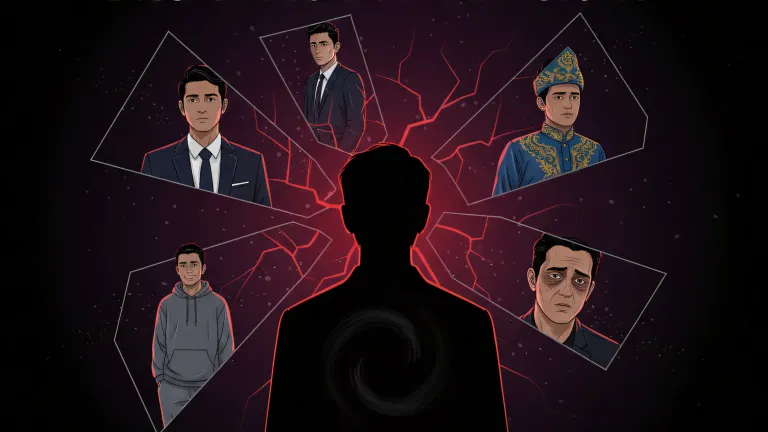
Warning: Kalau mana-mana ni sounds familiar, you’re not alone. 67% of young urban Malays are struggling dengan benda yang sama.
At 2 AM, scrolling through LinkedIn sambil lying in his overpriced KL apartment, Ahmad realizes something terrifying: dia dah tak tahu siapa dia sebenarnya.
Graduate degree? ✓
“Good” job? ✓
Family approval? ✓
Crippling sense that none of it matters? ✓
Macam mana boleh jadi camni?
Quick Reality Check: Are You Living This Crisis?
Answer jujur-jujur:
- Do you rasa penat from being different people dalam different spaces?
- Does your gaji barely cover your basic needs despite your education?
- Are you questioning everything mak ayah ajar about success?
Kalau yes, continue reading. The statistics akan shock you.
The Brutal Truth: What Research Sebenarnya Shows
Key Finding: This isn’t personal failure. Ini systematic breakdown.
- 70% of graduates kerja below their skill level
- 60.5% experience anxiety symptoms
- 45.6% report depression
- 1 in 10 pernah consider suicide
These aren’t just numbers. Ini kawan-kawan you, colleagues, maybe you sendiri.
Pepatah lama kata: “Tak kenal maka tak cinta.” But what happens bila you tak kenal diri sendiri?
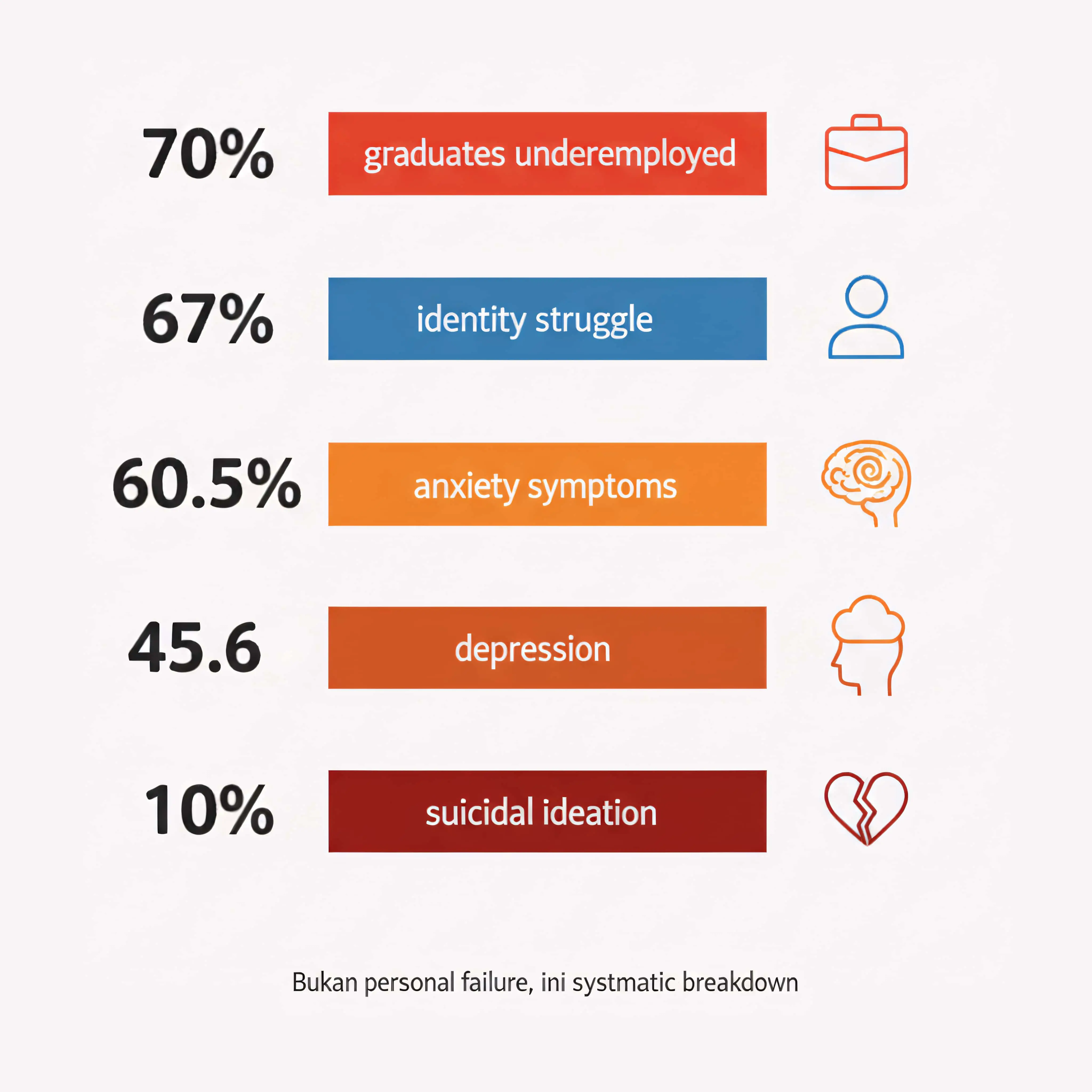
Sign #1: Switching Identities All Day (Dan It’s Draining)
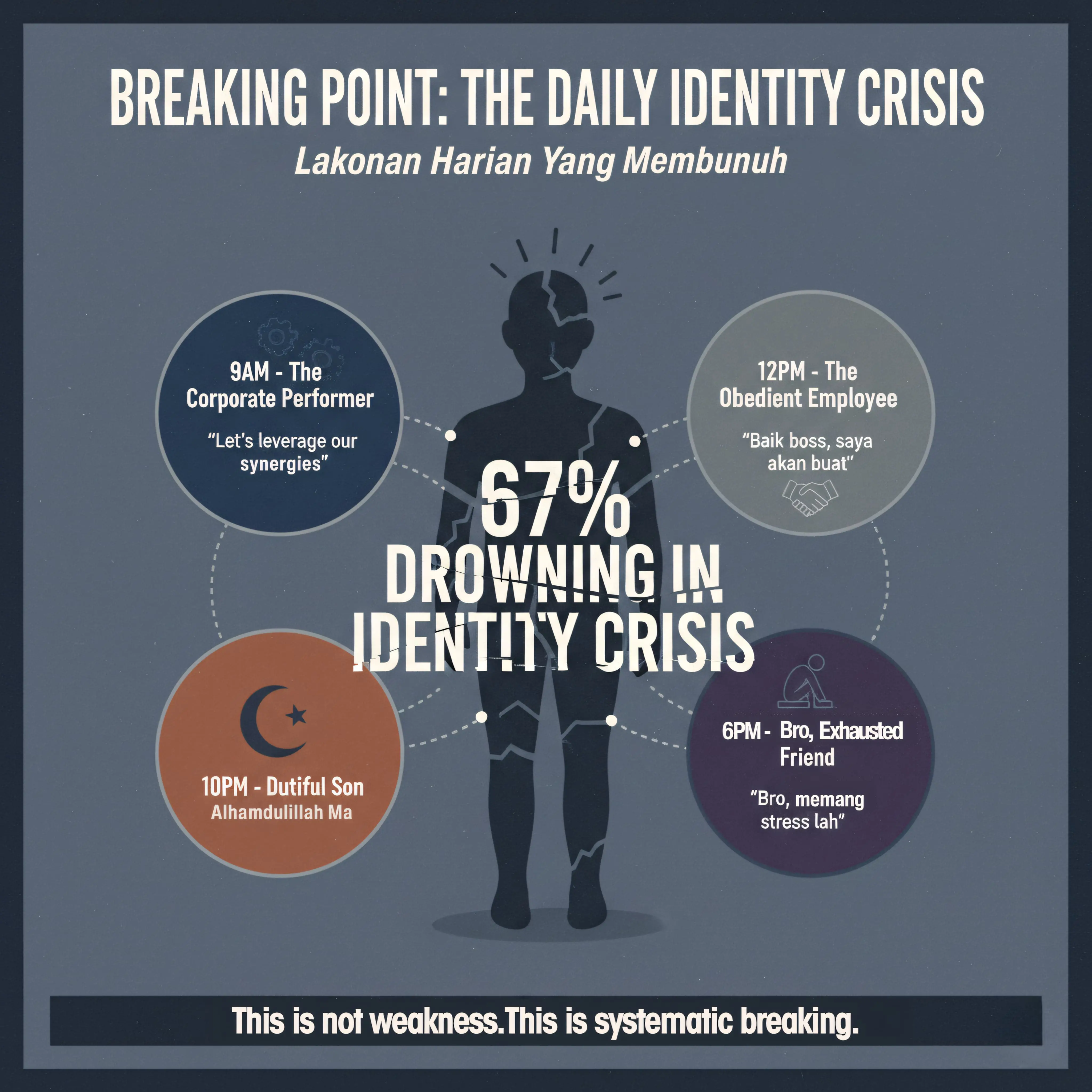
The Exhausting Reality:
- 9 AM: Professional English dalam boardroom - “Let’s leverage our synergies”
- 12 PM: Respectful Bahasa dengan senior colleagues - “Baik boss, saya akan buat”
- 6 PM: Casual chat with uni friends - “Bro, boss I memang babi lah”
- 10 PM: Dutiful son on family WhatsApp - “Alhamdulillah, semua okay Ma”
Each switch drain his energy. Each performance rasa more fake than the last.
Macam wayang kulit - same person, different personas for different audiences. But unlike wayang, takde intermission.
The Research: Young Malays now identify as “Muslim first” (67%) rather than “Malay first” - cari stable identity anchors dalam cultural chaos.
Quick Self-Check:
- Berapa banyak different “versions” of yourself you present daily?
- Yang mana satu feels most authentic?
- How often you rasa exhausted from switching between them?
Local wisdom says: “Biar putih mata, jangan putih hati.” But what if semua mata pun dah tak putih?
Sign #2: That Degree Jadi Empty Promise
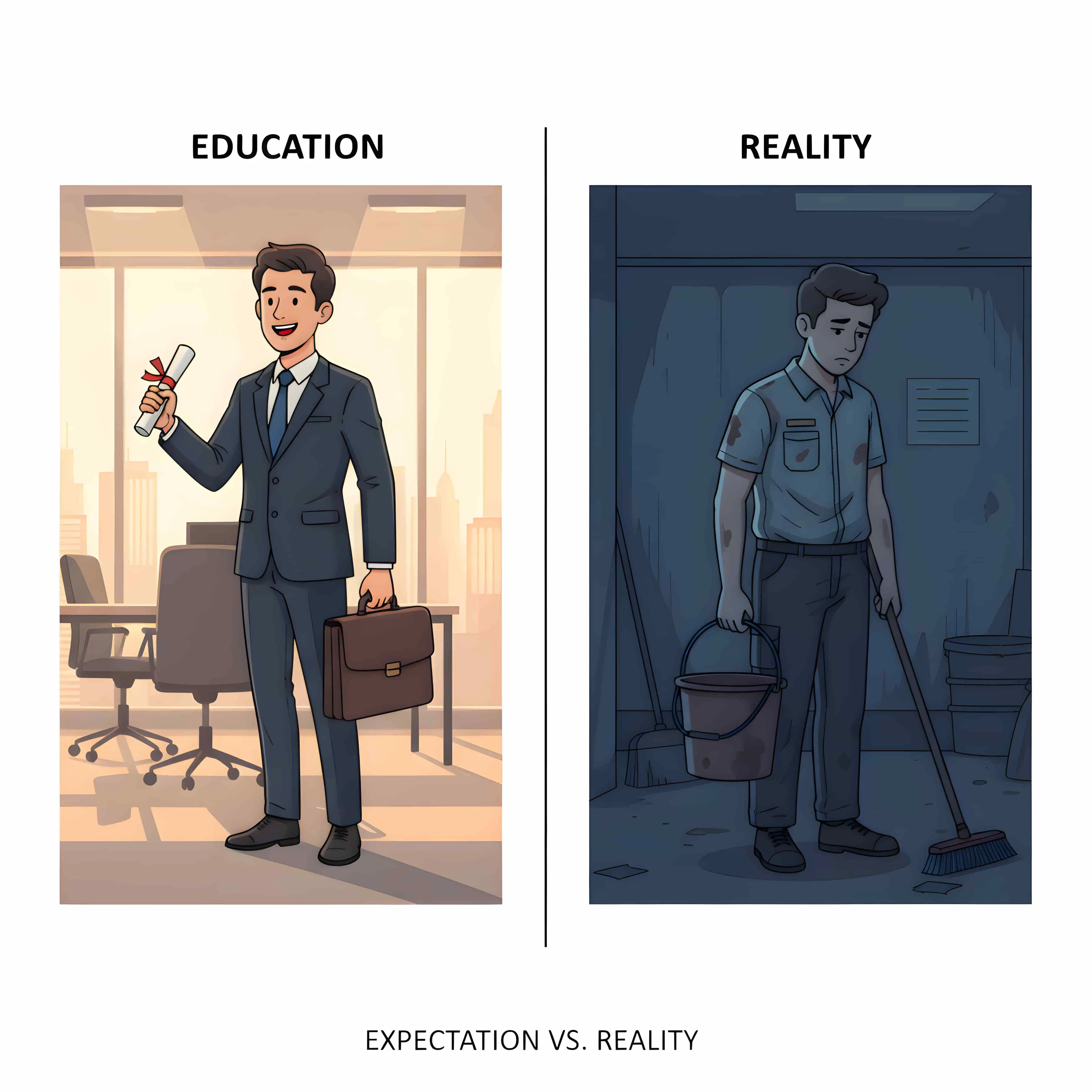
The Promise: Study rajin → Good job → Financial security
The Reality: RM50,000 hutang PTPTN → Job any SPM graduate boleh buat → “Gaji cukup makan je”
Shocking Statistics:
- 70% of graduates kerja dalam semi-skilled/low-skilled roles
- 32.4% skills mismatch rate (naik from 22.9% in 2016)
- 12.28% youth unemployment vs 3.3% national average
Dia trust the system. System tipu dia balik.
Common Experience Patterns:
- Engineering degree → Insurance sales agent
- Business degree → Customer service rep
- IT degree → Data entry clerk
- Any degree → “Okay, kita train you from zero”
Macam beli nasi lemak mahal dapat telur rebus kosong.
Sign #3: That Paycheck Is Monthly Reality Check
The Math Yang Tak Masuk Akal:
Monthly Reality for 25-29 Year Olds:
- Median gaji: RM2,206
- Room sewa (KL): RM800-1,200
- Car loan: RM400-600
- Minyak: RM300-400
- Makan: RM500-700
- Phone/internet: RM150-200
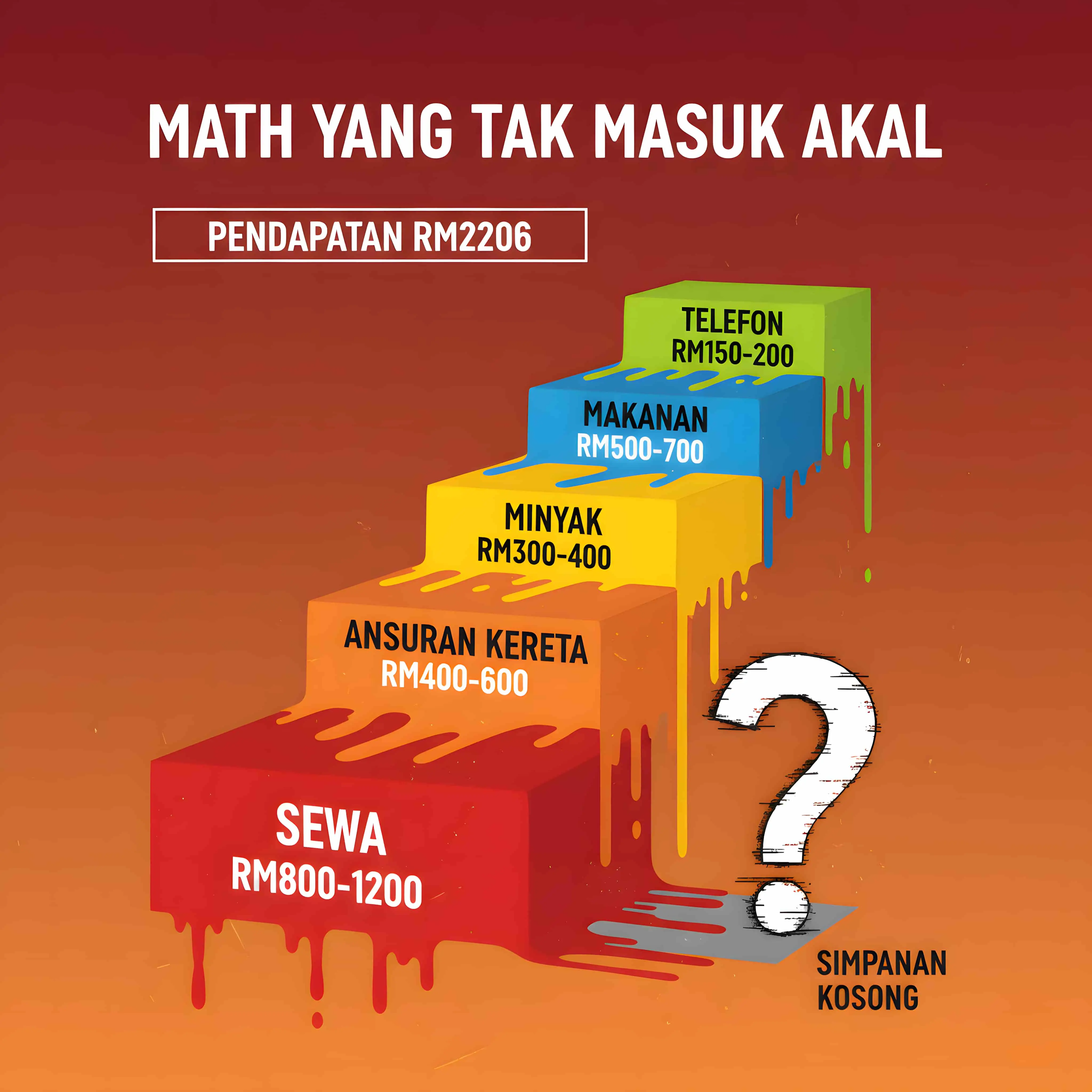
Apa tinggal untuk savings? For house deposit? For kahwin fund?
Jawapan: Kosong.
The Psychological Impact:
- 54% of Gen Z sebut long-term finances as top stressor
- 52% worry about belanja harian
- Housing affordability crisis buat homeownership jadi mimpi ngeri
Pepatah kata “Sikit-sikit, lama-lama jadi bukit.” Tapi bukit apa bila sikit pun takde?
Sign #4: Social Media Jadi Sandiwara Profesional (Fake Tapi Exhausting)
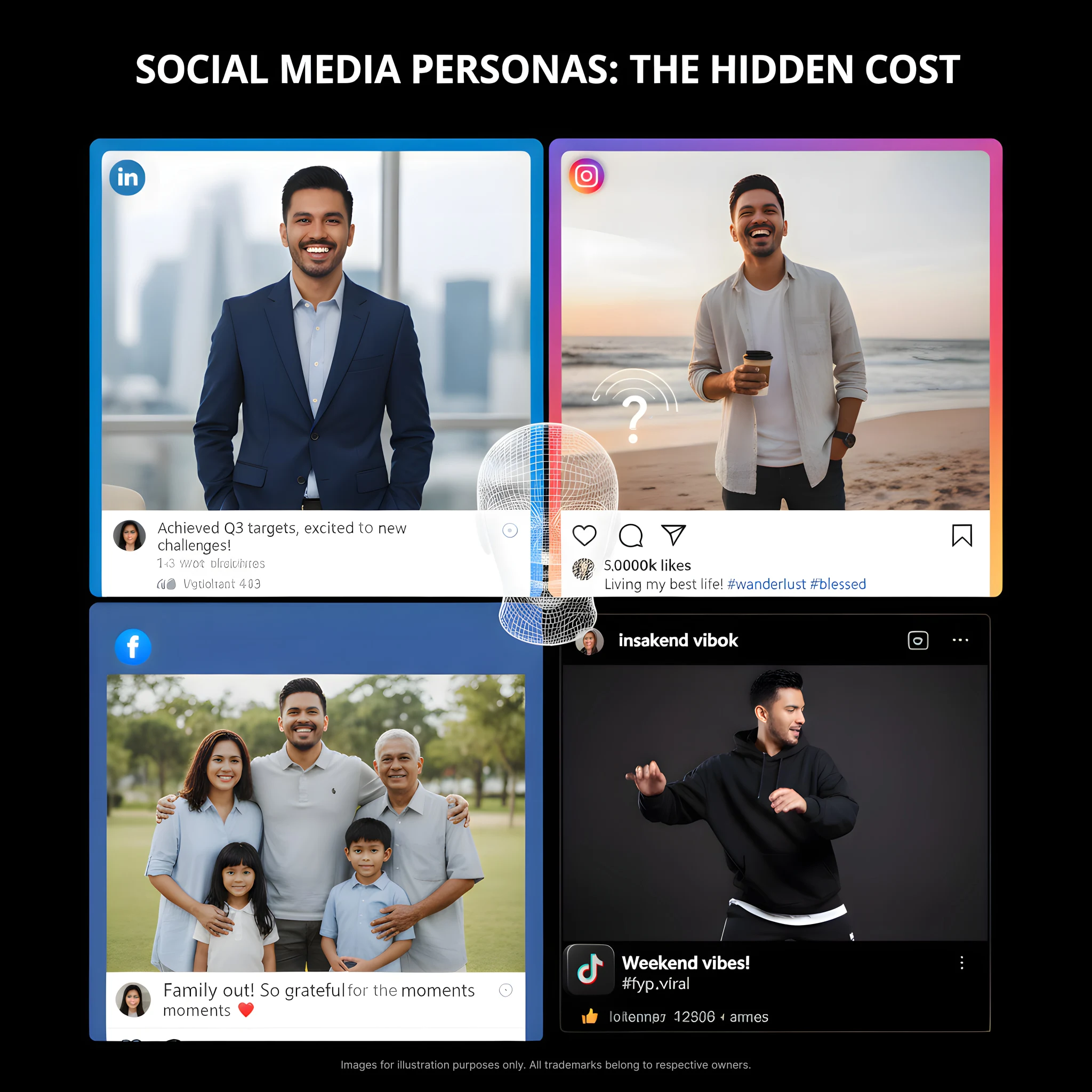
The Performance Platforms:
- LinkedIn: Ambitious thought leader - “Grateful for this learning opportunity”
- Instagram: Successful lifestyle curator - “Alhamdulillah for this blessing”
- Facebook: Happy family member - “Family time is the best time ❤️”
- TikTok: Relatable content creator - “POV: You’re Malay and confused”
Behind the posts: Anxiety, comparison, validation-seeking spiral yang tak henti.
Research Reality:
- 83% of Malaysians active on social media
- Constant social comparison linked to depression spikes
- Personal branding pressure buat professional/personal boundaries jadi blur
The Hidden Cost: Every post requires tenaga emosi. Every like jadi addiction. Every algorithm change ancam identity.
Macam berlakon dalam drama yang takde ending.
Sign #5: Workplace Jadi Perang Generasi
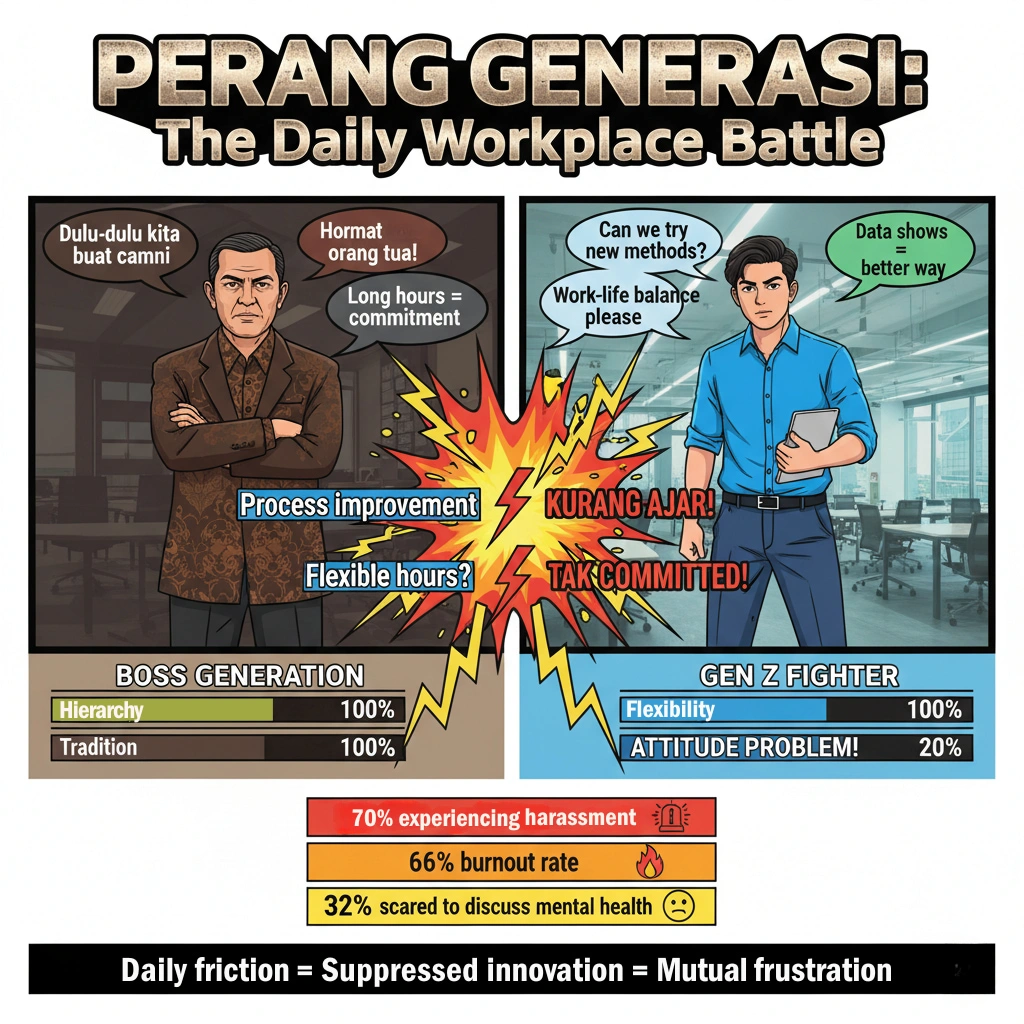
The Daily Battle:
- His values: Transparency, collaboration, work-life balance
- Boss’s values: Hierarchy, long hours, “hormat orang tua”
- Result: Daily friction, suppressed innovation, mutual frustration
Workplace Reality Check:
- 70% of Gen Z experience harassment/microaggressions
- 66% report workplace burnout
- 32% tak comfortable discuss mental health dengan employers
Typical Scenarios:
- Suggest process improvement → “Budak ni kurang ajar”
- Request flexible hours → “Tak committed langsung”
- Question outdated methods → “Attitude problem ni”
Boss cakap: “Dulu-dulu kita buat camni.” But hello Uncle, dulu-dulu takde internet pun.
Traditional saying: “Biar lambat asalkan selamat.” Modern reality: Lambat means ketinggalan everything.
Sign #6: Mental Health Tenggelam Dalam Cultural Silence
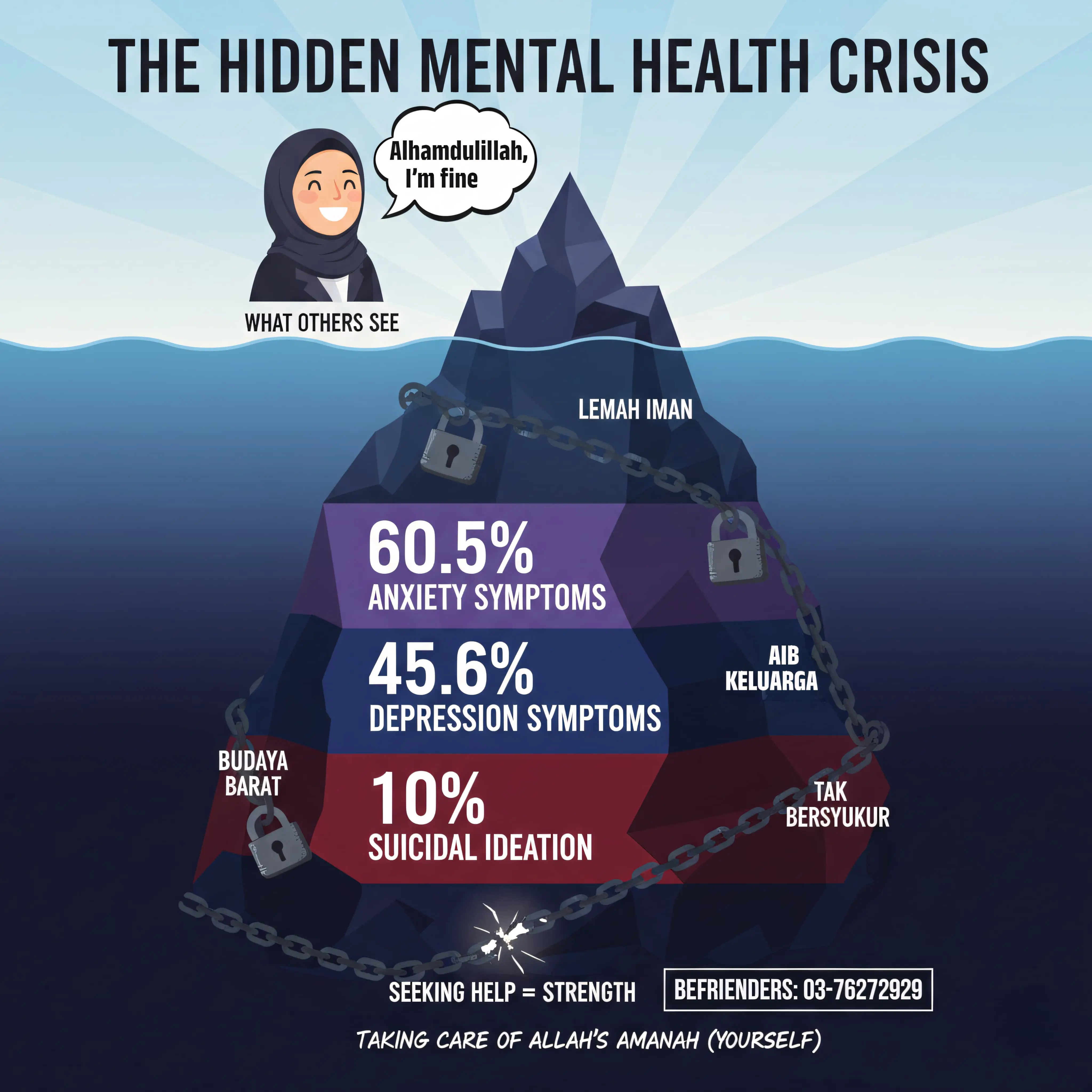
The Hidden Epidemic:
- Depression symptoms: 45.6% of higher education youth
- Anxiety symptoms: 60.5%
- Suicidal ideation: 10%
But cultural stigma means suffering dalam senyap.
The Silence Trap:
- Mental health = “lemah iman”
- Therapy = “budaya Barat”
- Medication = “risiko ketagihan”
- Result: Quarter of young professionals tipu employers about mental health days
Support System Breakdown:
- Extended family dah weak sebab urbanization
- Traditional community bonds putus sebab city life
- Religious support kadang-kadang tambah guilt instead of help
Orang tua selalu cakap: “Redha je lah, ujian Allah.” But bila ujian ni systemically created by manusia?
Important note: Seeking help is NOT lemah iman. It’s taking care of Allah’s amanah - which is YOU.
Sign #7: The Success Formula Dah Completely Rosak
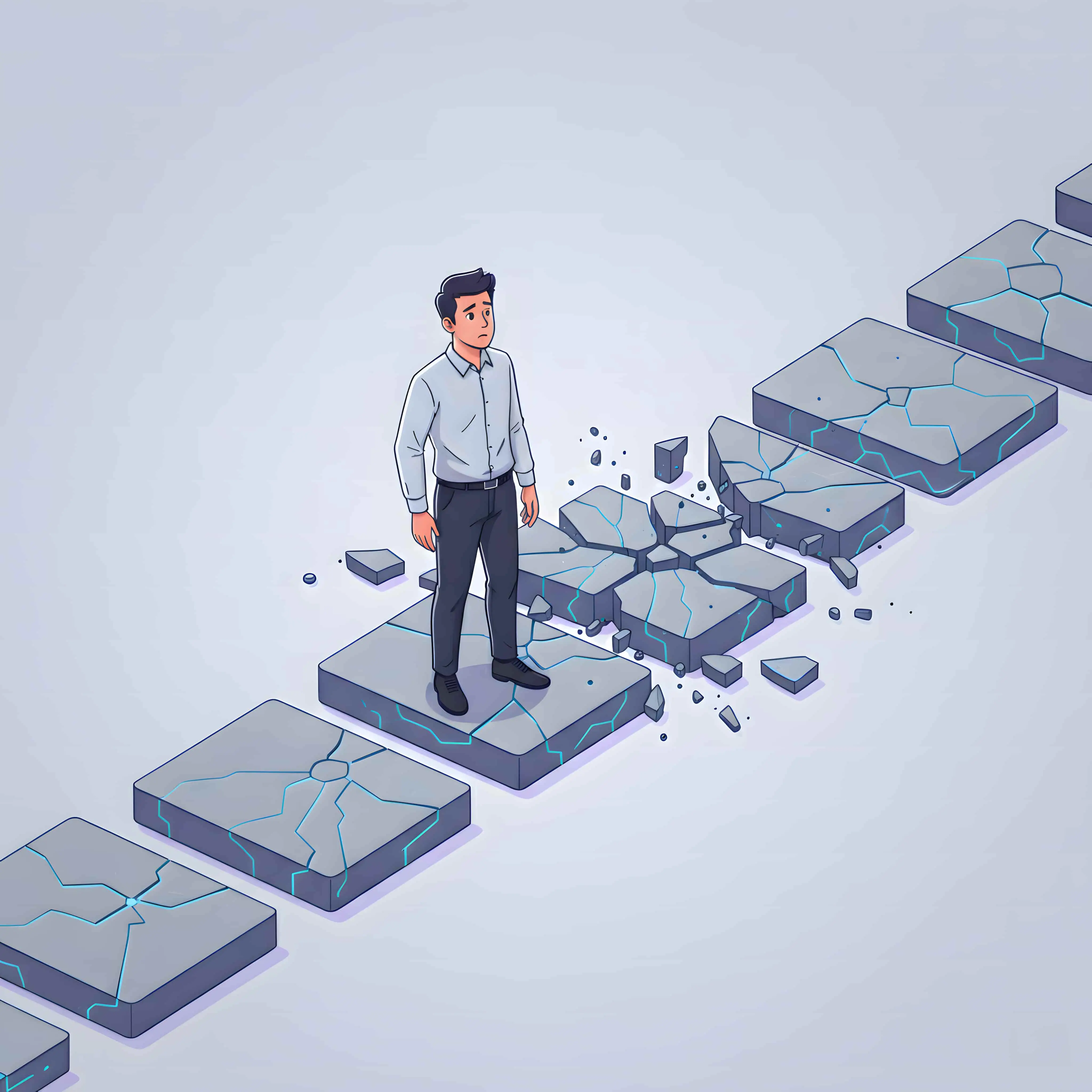
What Kita Diajar:
- Study rajin-rajin
- Get degree
- Cari kerja bagus
- Beli rumah
- Kahwin
- Ada anak
- “Hidup bahagia selamanya”
What Kita Jumpa:
- Study rajin ✓
- Get degree ✓
- Jumpa kerja yang tak appreciate kita
- Harga rumah macam harga rocket
- Kahwin kena ada duit yang kita takde
- Anak? Dalam economy ni?
- Question everything setiap hari
The Fundamental Shift: Success metrics designed untuk different era dah tak applicable untuk current reality.
Macam guna map lama untuk navigate highway baru.
Common Concerns: What Young Professionals Tanya Paling Banyak
”Ke ni je I yang ungrateful?”
Tak. This is systemic failure yang affect seluruh generation. Individual gratitude tak boleh fix structural problems.
”Patut ke I just accept lower expectations?”
Accepting broken systems akan perpetuate them. Your aspirations tak unreasonable - the obstacles yang artificially created.
”Will this get better dengan time?”
Not without deliberate change. Research shows problems makin teruk, tak improve naturally.
”What boleh I actually buat pasal ni?”
Tengok actionable steps bawah ni.
Immediate Next Steps: What Actually Works
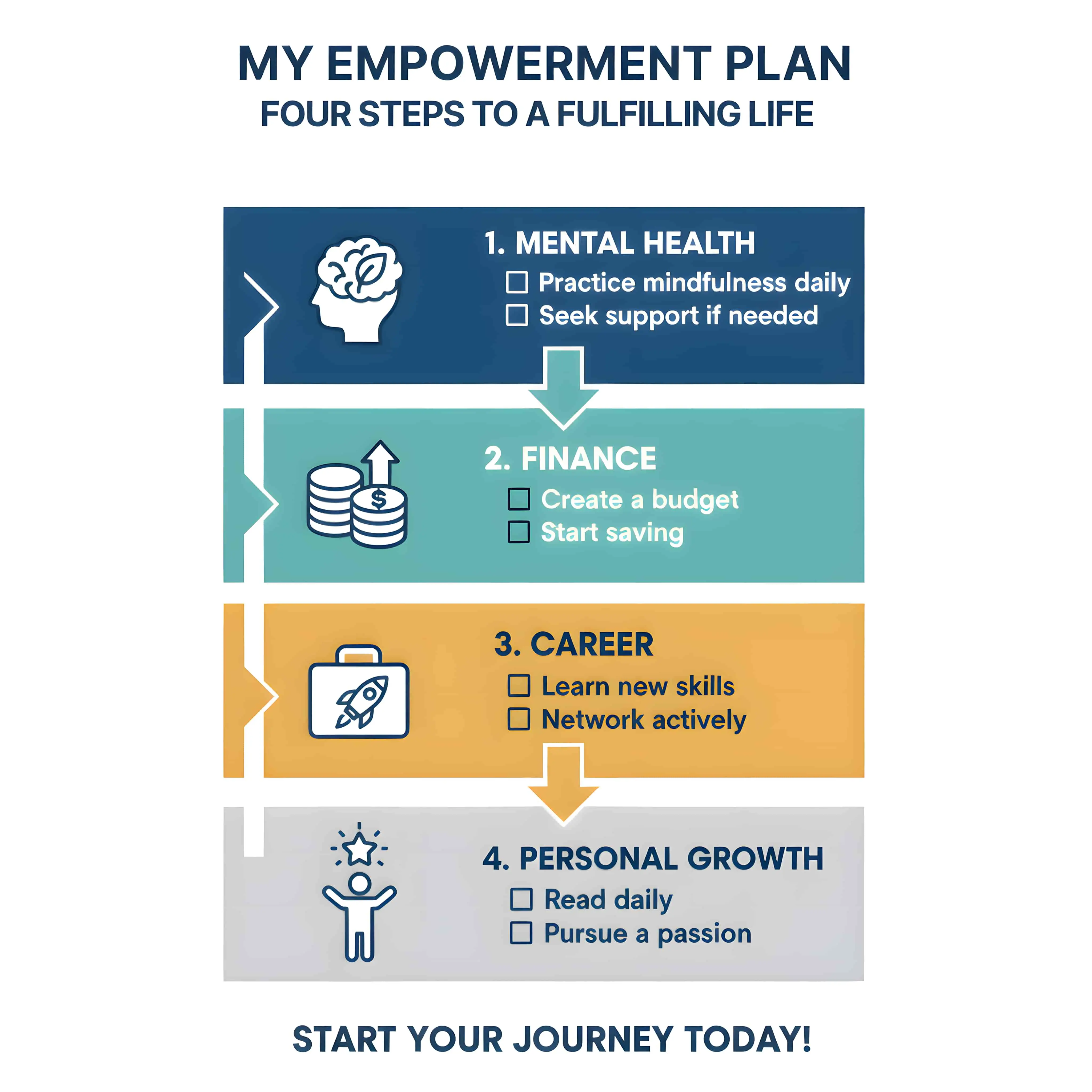
Mental Health First (Minggu Ni Jugak)
- Acknowledge yang ni bukan personal failure
- Cari satu orang untuk discuss perasaan ni honestly
- Research mental health resources (MMHA, online platforms)
- Consider therapy as kekuatan, bukan kelemahan
Financial Reality Check (Bulan Ni)
- Calculate betul-betul cost of living vs income
- Research housing alternatives (co-living, suburbs)
- Explore additional income streams
- Join financial literacy programs
Career Strategy Shift (Next 3 Bulan)
- Skills audit: Apa you betul-betul nak develop?
- Network dengan orang yang buat meaningful work
- Research companies dengan better generational balance
- Consider entrepreneurship/freelancing options
Identity Integration (Ongoing Process)
- Define core values independent of external expectations
- Practice authentic communication across semua platforms
- Set boundaries around performance demands
- Build support network dengan orang yang face similar challenges
Remember: “Sedikit demi sedikit, lama-lama jadi bukit.” Small consistent actions akan lead to significant change.
Resources Untuk Deeper Understanding
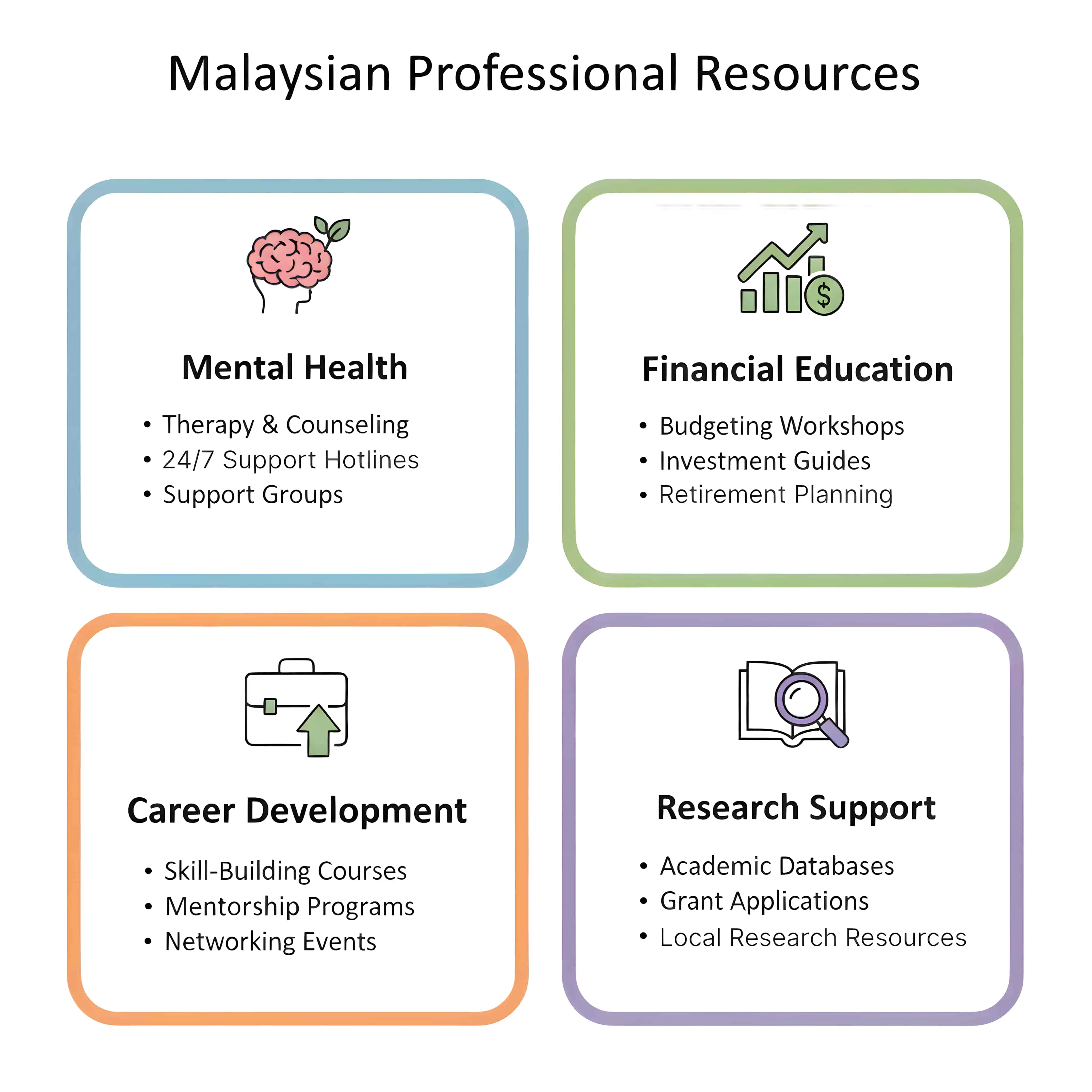
Mental Health Support
- Malaysian Mental Health Association (MMHA): Professional counseling yang betul-betul faham local context
- Befrienders Malaysia: 24/7 suicide prevention hotline - 03-76272929
- Online platforms: Accessible therapy options yang more affordable
Financial Education
- AKPK (Agensi Kaunseling dan Pengurusan Kredit): Debt management dan budgeting yang realistic
- EPF financial planning: Retirement dan savings strategies
- Investment education: Long-term wealth building untuk anak cucu
Career Development
- Professional associations: Industry-specific networking yang meaningful
- Skills upgrading programs: Government-funded training yang actually useful
- Mentorship platforms: Connect dengan career guides yang get it
Research and Data
- Malaysian Youth Mental Health Index 2023: Comprehensive statistics yang validating
- ISEAS-Yusof Ishak Institute: Political and social research
- Department of Statistics Malaysia: Economic dan employment data yang real
The Real Question Bukan “Apa Salah I?”
It’s “Apa Salah Dengan System Ni?”
Bila 70% of graduates are underemployed, the problem bukan individual capability.
Bila 60% experience anxiety symptoms, the issue bukan personal weakness.
Bila entire generation question taught success formulas, maybe the formulas kena updating.
Recognition is the first step toward change.
You’re not broken. System ni yang broken.
Your struggles tu valid. Your aspirations tu reasonable.
Your generation deserve better. Dan change starts dengan understanding yang these challenges are shared, bukan individual.
The identity crisis bukan character flaw - it’s rational response to irrational circumstances.
Peribahasa lama kata: “Gajah sama gajah bergaduh, pelanduk mati di tengah-tengah.” But what if semua pelanduk bergabung tenaga?
Now the real work begins: building something better together.
Ingat: “Bersatu kita teguh, bercerai kita roboh.” Your generation punya strength is dalam unity and shared understanding.
The crisis is real. But so is your resilience. So is your potential for change.